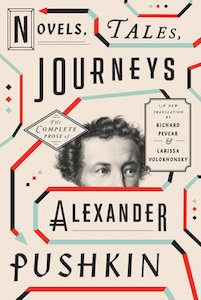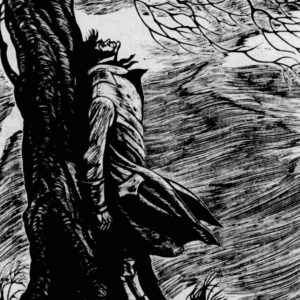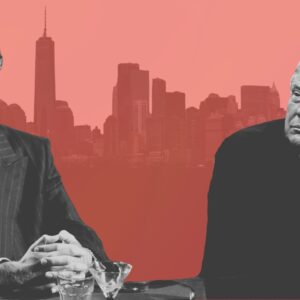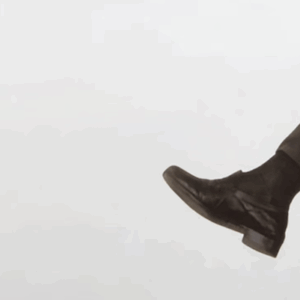
The Duel: Pushkin's Favorite Topic in Fiction and Cause of His Fatal Wound
A Newly Translated Story by Alexander Pushkin
We fought a duel.
BARATYNSKY[1]
I swore I would shoot him by the rules of dueling (I had not yet taken my shot at him).
An Evening at Bivouac[2]
We were stationed in the small town of * * *. Everyone is familiar with the life of an army officer. In the morning, drill and riding practice; dinner at the regimental commander’s or in a Jewish tavern; in the evening, punch and cards. There was not a single open house in * * *, not a single marriageable girl; we gathered in one another’s rooms, where there was nothing to be seen but our uniforms.
Only one man belonging to our group was not military. He was about thirty-five, and for that we considered him an old man. Experience gave him many advantages over us; besides that, his habitual sullenness, tough character, and wicked tongue had a strong influence on our young minds. Some mysteriousness surrounded his fate; he seemed Russian, but had a foreign name. He had once served in the hussars, and even successfully; no one knew what motive had prompted him to retire and settle in a poor little town, where he lived both poorly and extravagantly: he always went about on foot, in a shabby black frock coat, yet he kept open house for all the officers of our regiment. True, his dinners consisted of two or three dishes prepared by a retired soldier, but then the champagne flowed in streams. No one knew his fortune, or his income, and no one dared to ask him about it. He had some books, mostly military, but also novels. He willingly lent them out, and never asked for them back; then, too, he never returned a borrowed book to its owner. His main exercise consisted in shooting pistols. The walls of his room were all riddled with bullet holes like a honeycomb. A fine collection of pistols was the only luxury in the poor clay-and-wattle hovel he lived in. The skill he had achieved was unbelievable, and if he had volunteered to knock a pear off of somebody’s cap with a bullet, no one in our regiment would have hesitated to offer him his head. The conversation among us often touched upon duels; Silvio (as I shall call him) never mixed into it. To the question of whether he had ever fought a duel, he replied drily that he had, but did not go into the details, and it was clear that such questions displeased him. We supposed that some unfortunate victim of his terrible skill lay on his conscience. However, it never entered our heads to suspect him of anything like cowardice. There are people whose appearance alone removes such suspicions. An unexpected incident amazed us all.
Once some ten of our officers were having dinner at Silvio’s. We drank as usual, that is, a great deal; after dinner we started persuading our host to keep the bank for us. He refused for a long time, for he almost never gambled; finally he ordered the cards brought, poured some fifty gold pieces on the table, and sat down to deal. We gathered around him, and the game began. Silvio had the custom while gambling of maintaining a total silence, never argued and never explained. If a punter happened to miscalculate, he either paid what was owing immediately or noted down the excess. We already knew that and did not keep him from handling it his way; but among us there happened to be a recently transferred officer. While playing, he absentmindedly bent down an extra corner, doubling the stake. Silvio took the chalk and corrected the account as he usually did. The officer, thinking he was mistaken, started to explain. Silvio silently went on dealing. The officer, losing patience, took a brush and erased what he thought had been wrongly written. Silvio took the chalk and wrote it again. The officer, flushed with the wine, the gambling, and his comrades’ laughter, considered himself cruelly offended and, snatching a brass candlestick from the table in his fury, hurled it at Silvio, who barely managed to duck the blow. We were disconcerted. Silvio stood up, pale with anger, his eyes flashing, and said: “My dear sir, kindly leave, and thank God that this happened in my house.”
We had no doubt of the consequences and considered our new comrade already dead. The officer left, saying he was ready to answer for the offense whenever it suited Mister Banker. The play went on for a few more minutes; but, sensing that our host’s mind was not on the game, we stopped one by one and wandered off to our quarters, talking about the soon-to-be vacancy.
The next day, at riding practice, we were already asking if the poor lieutenant was still alive, when the man himself appeared among us. We put the same question to him. He replied that he had not yet had any news from Silvio. That surprised us. We went to Silvio and found him in the yard, planting bullet after bullet into an ace glued to the gate. He received us as usual, without saying a word about yesterday’s incident. Three days went by, and the lieutenant was still alive. We asked in astonishment: Can it be that Silvio won’t fight? Silvio did not fight. He contented himself with a very flimsy explanation and made peace.
This damaged him greatly in the opinion of the young men. Lack of courage is least excusable of all for young people, who usually see bravery as the height of human virtue and the excuse for all possible vices. However, it was all gradually forgotten, and Silvio regained his former influence.
I alone could no longer be around him. Endowed by nature with a romantic imagination, I was formerly attached most strongly of all to the man, whose life was an enigma and who seemed to me the hero of some mysterious tale. He liked me; at any rate, it was only with me that he abandoned his usual biting mockery and discussed various subjects with simple-heartedness and extraordinary charm. But after that unfortunate evening, the thought that his honor was stained and by his own fault had not been washed clean never left me and prevented me from behaving with him as before; I was ashamed to look at him. Silvio was too intelligent and too experienced not to notice it and not to guess the reason for it. It seemed to pain him; at any rate I noticed a couple of times that he wished to talk with me; but I avoided such occasions, and Silvio gave it up. After that I saw him only in the presence of my comrades, and our former candid conversations ceased.
The distracted inhabitants of capitals have no idea of many impressions well known to the inhabitants of villages or small towns, for instance, waiting for mail day. On Tuesdays and Fridays our regimental office was filled with officers: one was waiting for money, another for a letter, yet another for newspapers. Envelopes were usually opened then and there, news was exchanged, and the office presented a picture of great animation. Silvio had his letters addressed to our regiment, and he was usually to be found there. Once he was handed an envelope that he tore open with an air of the greatest impatience. As he skimmed the letter, his eyes flashed. The officers, each occupied with his own letters, did not notice anything. “Gentlemen,” Silvio said to them, “circumstances demand that I absent myself at once; I am leaving tonight; I hope you will not refuse to dine with me for a last time. I shall expect you, too,” he went on, turning to me. “Come without fail.” With those words, he hurriedly left, and, having agreed to meet at Silvio’s, each of us went his own way.
I came to Silvio’s at the appointed time and found almost all our regiment there. His belongings were already packed; there were only the bare, bullet-riddled walls. We sat down at the table. The host was in extremely high spirits, and his good cheer soon became general. Corks popped every minute, glasses foamed and fizzed nonstop, and with all possible zeal we wished the departing man a good journey and all the best. It was late at night when we rose from the table. As we were going for our caps, Silvio, saying good-bye to everyone, took me by the arm and stopped me at the very moment I was preparing to leave. “I must talk to you,” he said softly. I stayed.
The guests were gone. We two remained alone, sat facing each other, and silently lit our pipes. Silvio was preoccupied; there was no trace left of his convulsive gaiety. A grim pallor, flashing eyes, and the thick smoke coming from his mouth gave him the look of a real devil. Several minutes passed, and Silvio broke the silence.
“You and I may never see each other again,” he said to me. “Before we part, I would like to have a talk with you. You might have noticed that I have little respect for other people’s opinion of me; but I like you, and I feel it would be painful for me to leave an unjust impression in your mind.”
He paused and began to refill his burnt-out pipe; I was silent and lowered my eyes.
“You found it strange,” he went on, “that I did not demand satisfaction from that drunken madcap R––. You’ll agree that, having the right to choose weapons, his life was in my hands, and mine was almost safe. I could ascribe my restraint to magnanimity alone, but I don’t want to lie. If I could have punished R–– without any risk to my life, I would not have forgiven him for anything.”
I looked at Silvio in amazement. This confession totally disconcerted me. Silvio went on.
“Precisely so: I have no right to risk my life. Six years ago I was slapped in the face, and my enemy is still alive.”
My curiosity was greatly aroused.
“You didn’t fight with him?” I asked. “Circumstances must have separated you?”
“I did fight with him,” Silvio replied, “and here is a souvenir of our duel.”
Silvio stood up and took from a box a red cap with a gold tassel and galloon (what the French call a bonnet de police). He put it on. There was a bullet hole about two inches above the brow.
“You know,” Silvio went on, “that I served in the * * * hussar regiment. My character is familiar to you: I am accustomed to taking first place, but in my youth it was my passion. In our time rowdiness was in fashion: I was the foremost rowdy in the army. We boasted of our drunkenness: I outdrank the famous Burtsov, whose praises were sung by Denis Davydov.[3] Duels went on constantly in our regiment: I was in all of them, either as a second or as a participant. My comrades adored me, and the regimental commanders, who were constantly being replaced, looked upon me as a necessary evil.
“I was quietly (or not so quietly) enjoying my reputation, when a young man from a rich and noble family joined our regiment (I don’t want to say his name). Never in all my born days had I met a more fortunate and brilliant fellow! Picture to yourself youth, intelligence, good looks, the wildest gaiety, the most carefree courage, a big name, money that he didn’t bother to count and that never came to an end, and imagine the effect he was bound to make among us. My primacy was shaken. Enticed by my reputation, he began to seek my friendship; but I received him coldly, and he drew away from me without any regret. I came to hate him. His successes in the regiment and in the society of women drove me to utter despair. I began to seek a quarrel with him. To my epigrams he responded with epigrams which always seemed to me more unexpected and witty than mine, and which were certainly more amusing: he joked, while I was malicious. Once, finally, at a Polish landowner’s ball, seeing him the object of attention of all the ladies, and especially of the hostess, with whom I had a liaison, I spoke some crude banality into his ear. He flared up and slapped me. We rushed for our swords; the ladies all swooned; we were dragged apart, and that same night we went out to fight a duel.
“It was at dawn. I stood at the appointed place with my three seconds. With indescribable impatience, I awaited my opponent. The spring sun rose, and its heat could already be felt. I saw him in the distance. He was coming on foot, his jacket hung on his sword, accompanied by one second. We went to meet him. He approached, holding his cap, which was full of cherries. The seconds measured out twelve paces for us. I was supposed to shoot first: but my spiteful agitation was so strong that I could not count on the steadiness of my hand, and, to give myself time to cool off, I offered him the first shot. My opponent did not accept. We decided to draw lots: the first number went to him, the eternal favorite of fortune. He aimed and shot a hole in my cap. It was my turn. His life was finally in my hands; I looked at him greedily, trying to catch at least a trace of uneasiness. He stood facing my pistol, picking ripe cherries from his cap and spitting out the stones, which landed at my feet. His indifference infuriated me. What’s the use of taking his life, I thought, if he doesn’t value it at all? A malicious thought flashed through my mind. I lowered the pistol.
“‘It seems your mind is not on death now,’ I said. ‘You’re having breakfast. I wouldn’t want to hinder you.’
“‘You’re not hindering me in the least,’ he retorted. ‘Feel free to shoot. But, anyhow, suit yourself. Your shot remains yours; I’m always ready to be at your service.’
“I turned to my seconds, announced that I had no intention of shooting right then, and with that the duel ended.
“I retired from the army and withdrew to this little town. Since then not a single day has gone by that I have not thought of revenge. Now my hour has come . . .”
Silvio took from his pocket the letter he had received in the morning and gave it to me to read. Someone (apparently his agent) wrote from Moscow that a certain person would soon be entering into lawful matrimony with a young and beautiful girl.
“You can guess who that certain person is,” said Silvio. “I am going to Moscow. We shall see whether he accepts death before his wedding with the same indifference as when he awaited it over the cherries!”
With those words, Silvio stood up, flung his cap on the floor, and started pacing the room like a tiger in its cage. I listened to him without moving: strange, contradictory feelings stirred in me.
A servant came in and announced that the horses were ready. Silvio gripped my hand firmly; we kissed. He got into the cart, where two trunks lay, one with pistols, the other with his belongings. We said good-bye once more, and the horses galloped off.
* * * *
Several years went by, and domestic circumstances forced me to settle in a poor little village of the N–– district. Busy with my estate, I never stopped secretly sighing for my former noisy and carefree life. Hardest of all was accustoming myself to spending the autumn and winter evenings in complete solitude. I still managed to drag out the time till dinner, talking with the village headman, riding around the farm works, or visiting the new installations; but as soon as it began to get dark, I simply did not know what to do with myself. The small number of books I found in the bottoms of cupboards and in the storeroom I already knew by heart. The housekeeper Kirilovna had told me all the tales she was able to recall; the village women’s songs wearied me. I took to unsweetened liqueurs, but they gave me a headache; and, I confess, I was afraid of turning into a drunkard from grief, that is, a most grievous drunkard, of which I saw many examples in our district. I had no near neighbors except for two or three grievous ones, whose conversation consisted mostly of hiccups and sighs. Solitude was more tolerable.
Three miles away from me there was a rich estate that belonged to Countess B––; but no one lived there except the steward, and the countess had visited her estate only once, in the first year of her marriage, and had stayed no more than a month. However, in the second spring of my reclusion, a rumor went around that the countess and her husband were coming to her estate for the summer. In fact, they arrived at the beginning of June.
The arrival of a rich neighbor marks an important epoch for country dwellers. Landowners and their servants discuss it for two months before and three years after. As for me, I must confess that the news of the arrival of a young and beautiful neighbor had a strong effect on me; I burned with impatience to see her, and so, on the first Sunday after their arrival, I went to the village of * * * after dinner to introduce myself to their excellencies as their nearest neighbor and most humble servant.
A footman led me to the count’s study and went to announce me. The vast study was decorated with all possible luxury; the walls were lined with bookcases, with a bronze bust on top of each; above the marble fireplace was a wide mirror; the floor was covered with green felt and overlaid with carpets. Having lost the habit of luxury in my poor corner, and not having seen other people’s wealth for a long time, I grew timid and waited for the count with a certain trepidation, the way a provincial petitioner awaits the appearance of a minister. The door opened, and a very handsome man of about thirty-two came in. The count approached me with an air of openness and friendliness; I tried to take heart and was about to introduce myself, but he forestalled me. We sat down. His conversation, free and amiable, soon dispelled my wild shyness; I was already beginning to return to my normal state, when the countess suddenly came in, and I was overcome by a greater confusion than before. She was indeed a beauty. The count introduced me; I wanted to seem free and easy, but the more I tried to assume an air of nonchalance, the more awkward I felt. To give me time to recover and accustom myself to my new acquaintances, they started talking to each other, treating me as a good neighbor and without ceremony. Meanwhile I started pacing up and down, examining the books and paintings. I am not a connoisseur of paintings, but one of them caught my attention. It represented some view of Switzerland; but what struck me in it was not the picture, but the fact that it had been pierced by two bullets in the same spot.
“That’s fine shooting,” I said, turning to the count.
“Yes,” he said, “quite remarkable. Are you a good shot?” he went on.
“Fairly good,” I replied, glad that the conversation had finally touched upon a subject close to me. “I wouldn’t miss a card at thirty paces—with familiar pistols, of course.”
“Really?” said the countess, with a look of great attentiveness. “And you, my love, can you hit a card at thirty paces?”
“Someday we’ll give it a try,” replied the count. “In my time I wasn’t a bad shot; but it’s four years now since I’ve touched a pistol.”
“Oh,” I remarked, “in that case I’ll wager Your Excellency couldn’t hit a card even from twenty paces: a pistol calls for daily practice. I know that from experience. I was reckoned one of the best shots in our regiment. Once it happened that I didn’t touch a pistol for a whole month: mine were being repaired. And what do you think, Your Excellency? The first time I tried shooting after that, I missed a bottle four times in a row at twenty-five paces. We had a captain, a wit, an amusing fellow; he happened to be there and said to me: ‘It’s obvious, brother, your hand refuses to raise itself against a bottle.’ No, Your Excellency, you mustn’t neglect that exercise, or else you’ll lose the habit just like that. The best shot I ever happened to meet used to practice at least three times before dinner every day. It was a habit with him, like a glass of vodka.”
The count and countess were glad that I had gotten to talking.
“And how did he shoot?” the count asked me.
“Here’s how, Your Excellency: he would see a fly land on the wall—you laugh, Countess? By God, it’s true. He would see the fly and shout, ‘Kuzka, my pistol!’ Kuzka brings him a loaded pistol. He goes—bang!—and the fly is squashed into the wall!”
“That’s astonishing!” said the count. “And what was his name?”
“Silvio, Your Excellency.”
“Silvio!” cried the count, jumping from his seat. “You knew Silvio?”
“What else, Your Excellency? We were friends; he was treated by our regiment as one of our own, a comrade; but it’s five years now since I’ve had any news of him. So that means Your Excellency knew him, too?”
“Knew him, yes, I knew him well. Did he never tell you . . . but no, I suppose not. Did he never tell you about one very strange incident?”
“Does Your Excellency mean the slap in the face he received from some scapegrace at a ball?”
“And did he tell you the name of that scapegrace?”
“No, Your Excellency, he didn’t . . . Ah, Your Excellency,” I went on, guessing the truth, “forgive me . . . I didn’t know . . . Can it have been you?”
“I myself,” the count replied, looking extremely upset, “and the bullet-pierced painting is a souvenir of our last meeting—”
“Ah, my dear,” said the countess, “for God’s sake don’t tell about it; I’d be frightened to listen.”
“No,” the count objected, “I’ll tell it all. He knows how I offended his friend; let him learn how Silvio took revenge on me.”
The count moved an armchair for me, and with the liveliest curiosity I listened to the following story.
“Five years ago I got married. The first month, the ‘honey-moon,’* I spent here in this village. I owe to this house the best moments of my life and one of the most oppressive memories.
“One evening we went out riding together. My wife’s horse started to balk; she got frightened, handed me the reins, and went home on foot. I rode ahead. In the yard I saw a traveling cart; I was told that there was a man sitting in my study who did not want to give his name, but simply said he had business with me. I went into that room and saw in the darkness a man covered with dust and overgrown with beard; he was standing here, by the fireplace. I went up to him, trying to recall his features.
“‘Don’t you recognize me, Count?’ he said in a trembling voice.
“‘Silvio!’ I cried, and I confess, I felt my hair suddenly stand on end.
“‘That’s right,’ he went on. ‘I owe you a shot; I’ve come to discharge my pistol. Are you ready?’
“The pistol was sticking out of his side pocket. I measured off twelve paces and stood there in the corner, begging him to shoot quickly, before my wife came back. He delayed—he asked for light. Candles were brought. I shut the door, gave orders to let no one in, and again begged him to shoot. He drew his pistol and took aim . . . I counted the seconds . . . I thought of her . . . A terrible minute went by! Silvio lowered his arm.
“‘I’m sorry,’ he said, ‘that the pistol isn’t loaded with cherry stones . . . bullets are heavy. I keep thinking that what we’re doing is not a duel, but murder: I’m not used to aiming at an unarmed man. Let’s start over; we’ll draw lots for who shoots first.’
“My head was spinning . . . It seems I did not agree . . . Finally we loaded another pistol; we rolled up two pieces of paper; he put them in the cap I had once shot through; again I drew the first number.
“‘You’re devilishly lucky, Count,’ he said with a grin that I will never forget. I don’t understand what happened to me and how he forced me into it . . . but—I shot and hit this painting.” (The count pointed his finger at the hole in the painting; his face was burning like fire; the countess was paler than her own handkerchief: I couldn’t help crying out.)
“I shot,” the count went on, “and, thank God, I missed. Then Silvio—he was truly terrible at that moment—Silvio began to take aim at me. Suddenly the door opened, Masha runs in and throws herself on my neck with a shriek. Her presence gave me back all my courage.
“‘My dear,’ I said to her, ‘don’t you see we’re joking? How frightened you are! Go, drink a glass of water, and come back to us; I’ll introduce you to my old friend and comrade.’
“Masha still did not believe it.
“‘Tell me, is my husband speaking the truth?’ she said, turning to the dreadful Silvio. ‘Is it true that you’re both joking?’
“‘He’s always joking, Countess,’ Silvio replied. ‘He once slapped me in the face for a joke; for a joke he shot a hole in this cap of mine; for a joke he missed hitting me a moment ago. Now I, too, feel like joking a bit . . .’
“With those words, he was about to take aim at me . . . in front of her! Masha threw herself at his feet.
“‘Get up, Masha, shame on you!’ I cried in fury. ‘And you, sir, will you kindly stop taunting the poor woman? Are you going to shoot, or not?’
“‘I won’t,’ Silvio replied. ‘I’m satisfied: I’ve seen your confusion, your dismay; I made you shoot at me, for me that’s enough. You will remember me. I leave you to your conscience.’ He was on his way out, but stopped in the doorway, glanced at the painting I had shot through, shot at it almost without aiming, and vanished. My wife lay in a swoon; my servants did not dare stop him and watched him with horror. He went out to the porch, called the coachman, and drove off before I had time to come to my senses.”
The count fell silent. It was thus that I learned the end of the story, whose beginning had once struck me so much. I never met its hero again. They say that, during the uprising of Alexander Ypsilanti, Silvio led a detachment of Hetairists and was killed at the battle of Skulyani.[4]
[1]Baratynsky: Evgeny Abramovich Baratynsky (1800–1844) was one of the major poets of Pushkin’s time; the epigraph is from his poem “The Ball” (1828).
[2]An Evening at Bivouac: A story by Alexander Alexandrovich Bestuzhev (1797–1837), who wrote under the name of Marlinsky. It was published in 1823.
[3]Denis Davydov: Denis Vasilyevich Davydov (1784–1839), poet and soldier, much admired by Pushkin, wrote what was known as “hussar poetry,” celebrating womanizing, drinking, and friendship. He distinguished himself during the Napoleonic Wars and was the model for the character Denisov in Tolstoy’s War and Peace. Alexander Petrovich Burtsov (d. 1813) was a hussar officer known for his swordsmanship and carousing. Davydov wrote three poems about him.
[4]Ypsilanti . . . Hetairists . . . Skulyani: The Greek prince Alexander Ypsilanti (1792–1828) served in Russia as an officer of the imperial cavalry during the Napoleonic Wars and then became leader of the Hetairists (Filiki Hetairia, “Society of Friends”), a secret society that instigated the Greek war of independence from the Ottoman Empire in 1821. They were defeated at the battle of Skulyani, in Bessarabia, on June 17, 1821.

From the book: NOVELS, TALES, JOURNEYS: The Complete Prose of Alexander Pushkin. Translation copyright 2016 by Richard Pevear and Larissa Volokhonsky. To be published by Knopf in November 2016.
Alexander Pushkin
Alexander Sergeyevich Pushkin was a Russian poet, playwright, and novelist of the Romantic era who is considered by many to be the greatest Russian poet and the founder of modern Russian literature. Pushkin was born into Russian nobility in Moscow.



















